News
President signs Dirty Water Order
Education, Environmental, Legislative, Regulatory
Posted on March 1st, 2017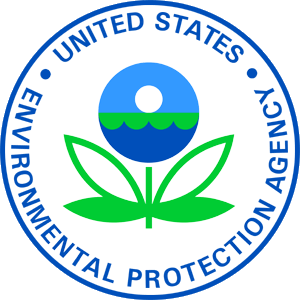
Tuesday, President Trump signed an executive order that is intended to weaken the Clean Water Act, a major federal law that has protected our Nation’s water since 1972. The 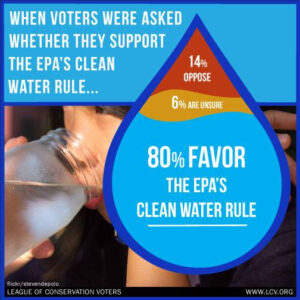 executive order, already dubbed the “Dirty Water Order,” directed Environmental Protection Agency Administrator Scott Pruitt, Attorney General Jeff Sessions and others to take a series of actions, long sought by industrial polluters, that will allow uncontrolled discharges of toxic pollution into much of our nation’s waters. Not wasting any time, within 24 hours, Scott Pruitt began the process to roll back clean water protections by beginning the steps needed to redefine which waterways are protected against pollution and destruction under the law. These steps clearly contradict the intent of the 1972 Clean Water Act.
executive order, already dubbed the “Dirty Water Order,” directed Environmental Protection Agency Administrator Scott Pruitt, Attorney General Jeff Sessions and others to take a series of actions, long sought by industrial polluters, that will allow uncontrolled discharges of toxic pollution into much of our nation’s waters. Not wasting any time, within 24 hours, Scott Pruitt began the process to roll back clean water protections by beginning the steps needed to redefine which waterways are protected against pollution and destruction under the law. These steps clearly contradict the intent of the 1972 Clean Water Act.
The Clean Water Act (CWA) has protected the Nation’s water from unregulated pollution since 1972, and many water bodies have been brought back from the crisis status they were in before the CWA was enacted. Rivers and streams were routinely used as sewers for industrial and human wastes prior to enactment of the CWA . As an example of the situation confronting our Nation, in 1969 the Cuyahoga River in Cleveland, Ohio actually caught fire, and before the CWA it was actually fairly common for rivers to catch fire in industrialized areas. The Cuyahoga fire and other events brought about a national realization that we could no longer treat our waters as dumping grounds, and isn’t life better as a result!
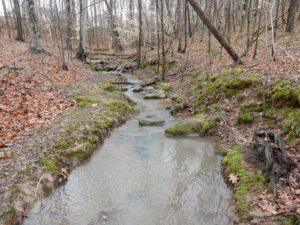
This week’s actions by the new federal administration seek to reverse the progress that has been made over past 45 years. The Dirty Water Order begins a process that would lead to the loss of protections for wetlands and small streams and will ultimately affect the drinking water sources for more than 117 million Americans. Many are unaware or uncaring about critical role small streams and wetlands play in supplying our drinking water and feeding into our rivers. In North Carolina, small streams constitute 56% of the stream miles that feed our drinking water supplies statewide, and they are at high risk of losing protection based on the Dirty Water Order. A map of North Carolina streams makes it obvious: small streams are an integral part of the drainage system that flows to our rivers and water supplies – if they aren’t protected, our water supply and recreational waters won’t be protected either.
Waterkeeper Alliance noted in their response to this action yesterday, “As Oklahoma’s [former] Attorney General, Pruitt and others joined with industry advocates to protect corporate interests instead of our nation’s waters. With this executive order, it is clear that the Trump administration intends to continue this industry-friendly strategy by dismantling the federal government’s ability to enforce basic clean water protections and control pollution, and stripping essential human health and water quality protections from rivers, streams, lakes, and wetlands that have been in place for more than 40 years. ”
Despite what corporate special interests, agribusiness and polluters claim, the Clean Water Rule does not regulate land or create any new permitting requirements – it makes it easier for businesses and individuals to know what waters are protected by the Clean Water Act and what waters aren’t. The only reason a person or business needs to worry about the Clean Water Rule is if they intend to pollute or destroy a federally protected river, stream, wetland or other surface water resource.
The Clean Water Action organization notes, “Nearly 45 years after the Clean Water Act was passed, many of our nation’s rivers, streams, lakes and bays are still not safe for swimming or fishing. We need to be doing more, not less, to rein in harmful polluting industries like industrial agriculture, oil and gas operations, and mining. These polluters should not get a free pass to cause real, direct harm to public health and the environment, while raking in huge profits. But that is exactly what this Dirty Water Order does.”
The Clean Water Rule and Clean Water Act is critical – polluting or destroying a water resource can obviously harm other water users, fish, and wildlife. Polluting activities need to be minimized to ensure that downstream neighbors are not harmed by upstream polluters. Wetlands and small streams need to be protected because they help reduce flooding and filter pollution.
Sound Rivers will redouble its efforts to rally the public and protect all the waters of the Neuse and Tar-Pamlico River basins. Please support our organization so we can continue this mission of clean swimmable, drinkable, fishable water.
More Information
EPA Clean Water Rule site (this site is likely be taken down soon)
Trump to Begin EPA rollback with order on clean water; NY Times article
Related News
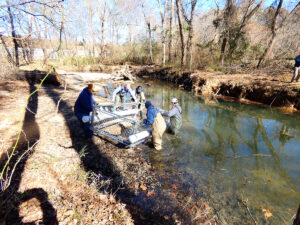
Walnut Creek trash trap install ‘a breeze’
January 22nd 2026
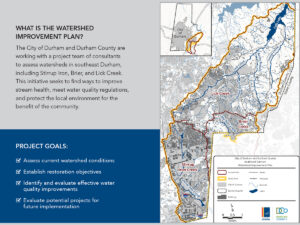
Riverkeeper: southeast Durham watershed improvement plan lacking key data
January 22nd 2026
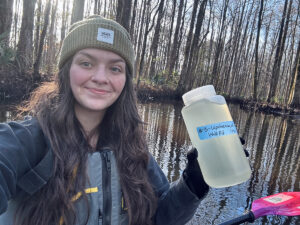
Specialist kicks off grant field work with Slocum Creek sampling
January 22nd 2026

Data center subject of Riverkeeper, county manager meeting
January 15th 2026

New tool determines best projects to minimize flood risk
January 15th 2026
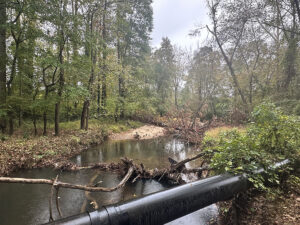
Sound Rivers set for newest trash trap install
January 15th 2026
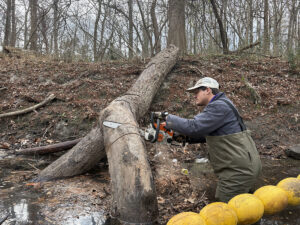
2nd trash trap gets chainsaw treatment
January 15th 2026

Great Blue Heron award recipients
January 15th 2026

